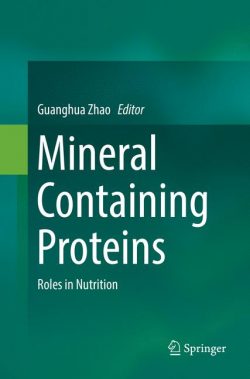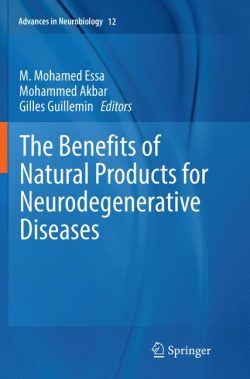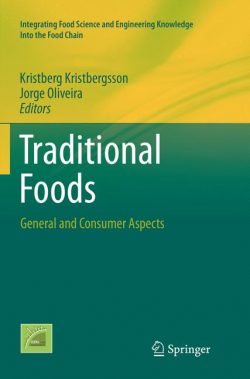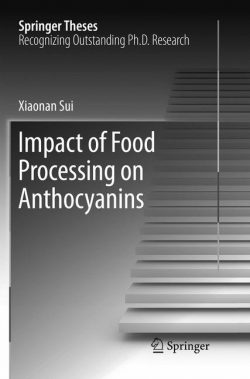This third book in the Trilogy of Traditional Foods, part of the ISEKI Food Series, covers the beneficial properties of functional foods from across the world. The volume is divided into four sections that address different key topics in the area of study.
are written by practicing Food Scientists or Engineers but are written with the interested general public in mind.The book should cater to the practicing food professional as well as all who are interested in beneficial properties of traditional foods.
Part I: General Functional Properties of Foods
1. Functional Aspects of Antioxidants in Traditional Food
Anna Gramza-Michalowska, and Dominik Kmiecik
2. Probiotics and Prebiotics in Traditional Food
Anna Gramza-Michalowska
3. Bioenrichment of Vitamin B12 in Fermented Foods
Busaba Yongsmith, Vichien Kitpreechavanich, Janpan Tansiitiaroenkun, Warawut Krusong
4. The Potential Health Benefits of
Traditional Thai Fermented Foods and Beverages
Sudsai Trevanich, Supunnikar Sribuathong and Damkerng Bundidamorn
5. Traditional Slovak Products as Functional Foods
Dezider Toth, Jan Brindza, Elena Panghyova, Stanislav Silhar
6. Functional and Nutritional Properties of Some Turkish Traditional Foods
Fahrettin Göğüş, Semih Ötleş, Ferruh Erdoğdu, Beraat Özçelik
Part II: Functional Properties of Cereal and Flour Foods
<
7. Functional Aspects of Carob Flour
Maria Cecilia Puppo and Daniel Pablo Ribotta
8. Salvia Hispanica: Nutritional and Functional Potential
Maira Rubí Segura Campos, Luis Antonio Chel-Guerrero, David Abram Betancur-Ancona
9. Cañahua: An Ancient Grain for New Foods
Gabriela T. Pérez, M. Eugenia Steffolani and Alberto E. León
10. Chemical Characterization of Mexican Chia (Salvia hispanica L.) Flour
Maira Ru
bí
Segura Campos, Luis Antonio Chel-Guerrero, Arturo Francisco Castellanos-Ruelas, David Abram Betancur-Ancona
11. Functional and Beneficial Properties of corn Tortilla
Luis Arturo Bello-Perez, Perla Osorio-Díaz, Edith Agama-Acevedo, Rosalia A. Gonzalez-Soto.
12. Boza a Traditional Cereal-Based Fermented Beverage; a Rich Source of Probiotics and Bacteriocin Producing Lactic Acid Bacteria
Johan W. von Mollendorff, Manuela Vaz- Velho and Svetoslav D. Todorov
13. Nutraceutical Properties of Amaranth and Chia Seeds
María Armida Patricia Porras Loaiza, Aurelio López-Malo, Maria Teresa Jiménez Munguía
14. Biofunctionality of Chia (Salvia hispanica L.) Protein Hydrolysates
Maira Rubí Segura Campos, Luis Antonio Chel-Guerrero, José Gabriel Rosado-Rubio, David Abram Betancur-Ancona
Part III: Functional Properties of Fruits and Other Plant Foods
15. Forgotten and Less Utilized Plant Species as Functional Food Resources
Jan Brindza, Dezider Toth, Peter Brindza, Olga Grygorieva, Jan Sajbidor, and Lucia Kucelova.
16. Antioxidant Properties and Health Benefits of Date Seeds
Moran Brouk and Ayelet Fishman
17. Antioxidant Capacity of Capsicum chinense Genotypes
Karen Ramírez-Gómez, Yolanda Moguel-Ordoñez, Maira Rubí Segura C
ampos, Jorge Carlos Ruiz-Ruiz, Luis Antonio Chel-Guerrero, David Abram Betancur-Ancona
18. Functional Components and Medicinal Properties of Cactus Products
Laura Iturriaga and Monica Nazareno
19. Chios Mastic Gum and its Food Applications
Adamantini Paraskevopoulou and Vassilios Kiosseoglou
20. Capsicum chinense: Composition and Functional Properties
Maira Rubí Segura Campos, Jorge Carlos Ruiz-Ruiz, Luis Antonio Chel-Guerrero, David Abram Betancur-Ancona
21. Nuts and Dried Fruits Potential as Functional Foods
Marta Magalhaes, Dora Santos, S. Marília Castro and Cristina L. M. Silva
22. Functional Food and Sustainable Development Once Met in The Argan Forest: The Tale Of The Argan Oil
Dom Guillaume, and Zoubida Charrouf
Part V: Honey and Beverages with Functional Properties
23. Functional and Nutritional Properties of Different Types of Slovenian Honey
Mojca Korošec, Jasna Bertoncelj, Terezija Golob, Urška Kropf
24. Functional Properties of Honey and Some Traditional Honey Products from Portugal
Teresa Cavaco and Ana Cristina Figueira
25. Functional Aspects of Tea Camellia sinensis as Traditional Beverage
Anna Gramza-Michalowska
26. Horchata De Chufa: A Traditional Spanish
Beverage with Exceptional Organoleptic, Nutritive and Functional Attributes
Eugenia Martin-E
sparza and Chelo Gonzalez-Martinez
biosensors. This third book in the Trilogy of Traditional Foods, part of the ISEKI Food Series, covers the beneficial properties of functional foods from across the world. The volume is divided into four sections that address different key topics in the area of study.
are written by practicing Food Scientists or Engineers but are written with the interested general public in mind.The book should cater to the practicing food professional as well as all who are interested in beneficial properties of traditional foods.
Addresses the beneficial or functional properties of tradition foods
Unique in its focus on traditional foods
Evaluates properties of foods that native consumers have believed to be beneficial





